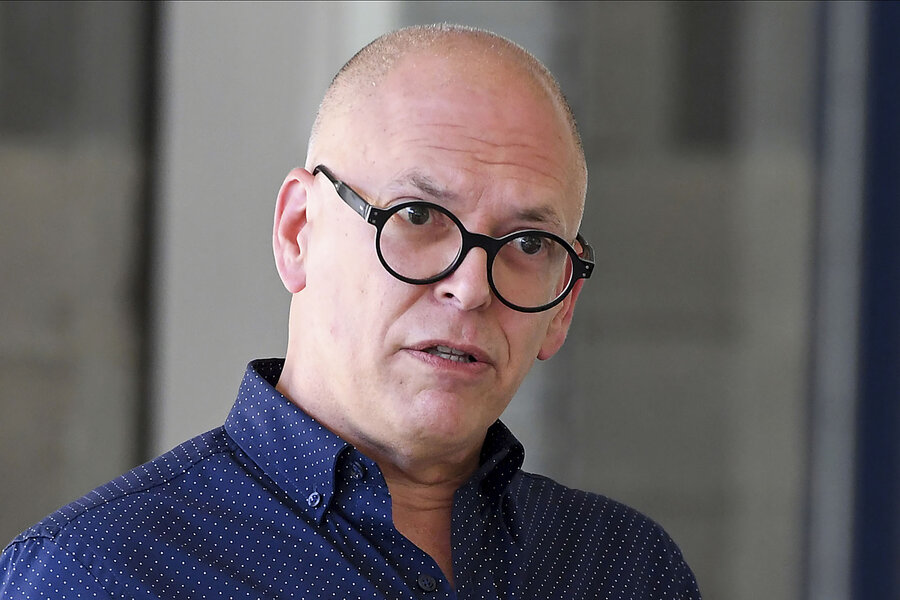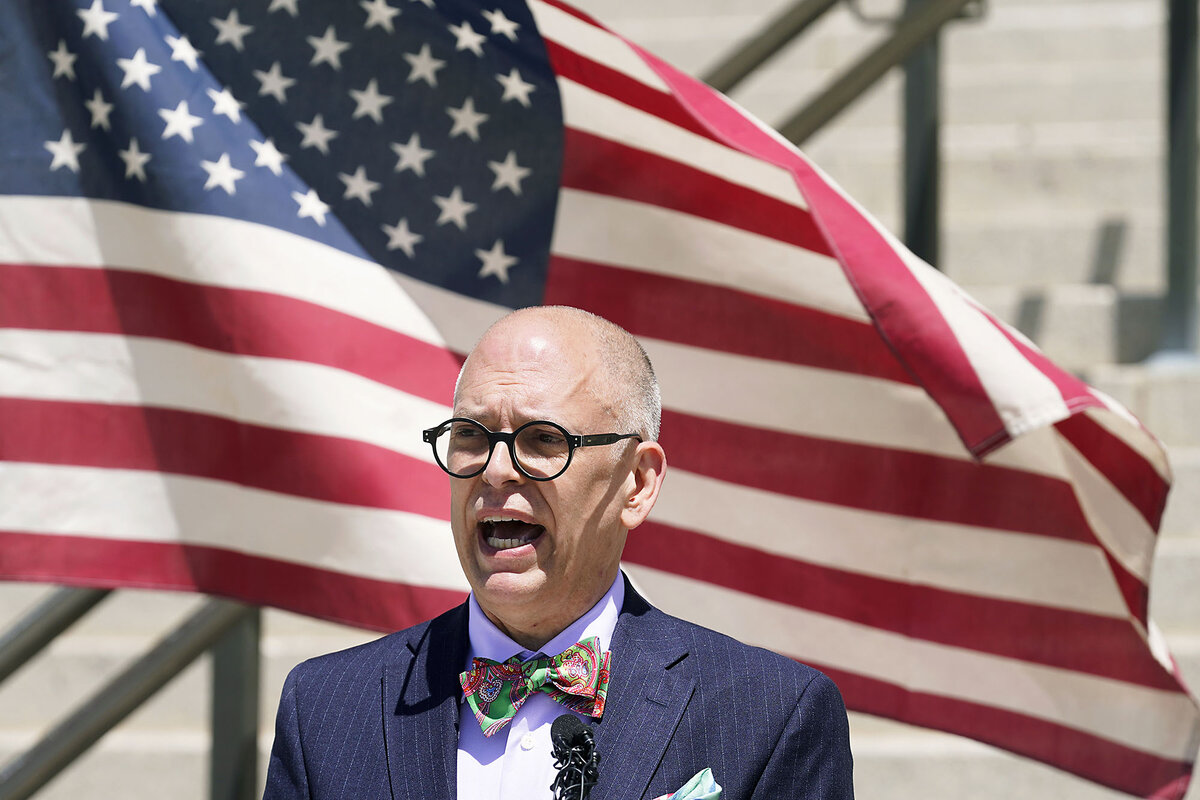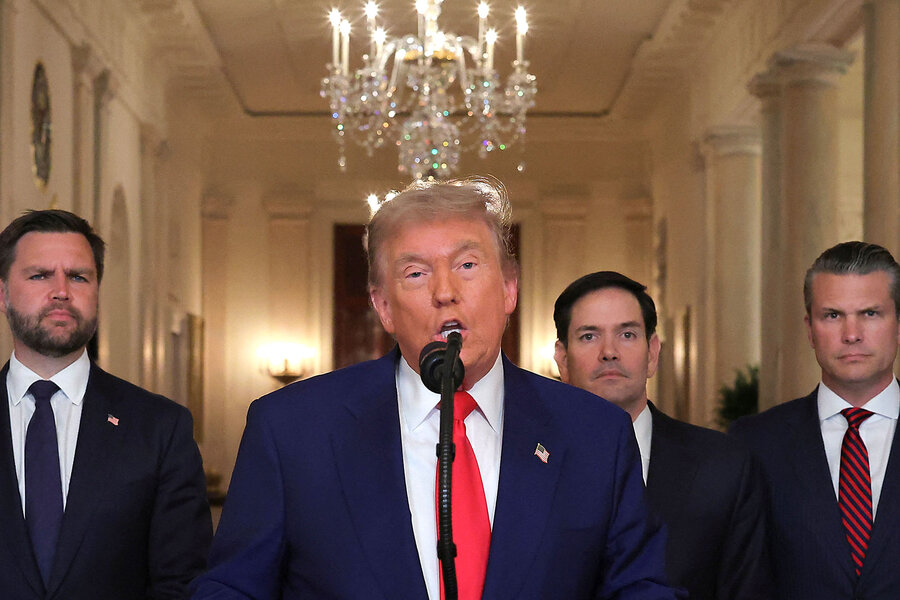Now Reading: Q&A: Jim Obergefell reflects on the case that bears his name
-
01
Q&A: Jim Obergefell reflects on the case that bears his name
Q&A: Jim Obergefell reflects on the case that bears his name

Ten years ago Thursday, the Supreme Court enshrined same-sex marriage as a constitutional right. Obergefell v. Hodges enabled LGBTQ+ couples to gain legal protections on a host of issues from parenting and health care to taxes and rights of survivorship.
Although his name is now synonymous with the push for marriage equality, Jim Obergefell, the lead plaintiff in the landmark case, never expected to become an activist.
In 2011, Mr. Obergefell’s late husband, John Arthur, was diagnosed with a terminal illness. The couple, who had been together for over two decades, married in Maryland two years later. But they soon realized that their home state of Ohio – which did not recognize same-sex unions – would not list Mr. Obergefell as Mr. Arthur’s surviving spouse.
Why We Wrote This
Ten years ago, the Supreme Court issued the landmark decision Obergefell v. Hodges, making same-sex marriage legal in all 50 states. Jim Obergefell says the legal fight was about protecting the dignity and equality of people like him and his late husband.
That kicked off a campaign that would profoundly change the lives of LGBTQ+ Americans, who had long fought for – and, in 36 states, won – the right to wed. The couple sued Ohio that year, notching a win in district court before an appeals court reversed the decision. By the time the case reached the Supreme Court in fall of 2014, more than a dozen couples had joined the suit.
Mr. Obergefell says he and Mr. Arthur fought not just for the right to call each other “husband,” but also for dignity – for themselves, and for the many other same-sex couples whose love the law did not recognize.
“John wanted to die a married man,” Mr. Obergefell says in a phone interview with the Monitor. “And I wanted the right to call myself his widower and have it mean exactly what it means to everyone else.”
Mr. Obergefell won that right in 2015, two years after Mr. Arthur died. When the court announced its decision, Mr. Obergefell said he hoped that the country would soon reach a day when “gay marriage” became known simply as “marriage.” Today, he celebrates the strides the United States has made toward that vision. A sizable majority – 68% of Americans – say same-sex marriages should be legal, according to polling from Gallup.
Yet Mr. Obergefell and other LGBTQ+ people and activists worry that marriage equality remains on shaky ground. This year, some Republican lawmakers have introduced state legislation asking the Supreme Court to overturn its previous decision as flawed.
In the following interview, which has been edited for length and clarity, Mr. Obergefell shares his views about the progress the country has made toward equality and what this polarized moment in U.S. politics might mean for the future of LGBTQ+ rights.
What was it like to be at the center of such a historic and consequential Supreme Court case?
Unexpected. Overwhelming in some ways. But also just such, such a joy to be part of something that made a huge difference in our nation and, you know, had such a positive impact on so many people across the country. Boy, what a wonderful experience it was.

Jim Obergefell speaks during a news conference at the Utah State Capitol, June 7, 2022, in Salt Lake City. “We need states across this country to say we see you, you exist. You deserve respect. You deserve protections, because your relationship is no different than any other,” said Mr. Obergefell. That year, Congress passed the Respect for Marriage Act, which enshrines protections for same-sex and interracial marriages.
How would you describe that experience?
You know, it was really the chance to meet people across the country. As the case was going, people would recognize me, and they would come up to me and want to shake my hand, share a story, share photos, tell me about their loved one, about their spouse, about their partner, about their kid.
It was a gift every single time it happened. And the fact that I had parents stop me and say, “Hey, Jim, could we take a photo of you with our child? Because thanks to you and the other people in this case, we know our kid can marry the person they love, whomever that happens to be.” I had closeted queer kids come out to me. They’d never come out to anyone before, but they came out to me.
What is it like for you now, to be reflecting on that case 10 years on?
For me, it goes back to part of my comments in front of the Supreme Court after the decision: “You know, I look forward to the day when this is not same-sex marriage or gay marriage, it’s just marriage.” And in so many ways that has happened because people across the country – family members, neighbors, coworkers – they know someone who has married someone because of this decision. So it’s become just marriage. And I love that.
Honestly, it was a really easy decision. The most important person in my life, the person I love the most, was dying. And we had wanted to get married since the mid-’90s.
We had to do all of these things that millions of other people never had to think about or consider. Being forced to go to another state to get a marriage license. Figuring out how to take a dying man with no physical abilities to another state to do something, again, that millions of others took for granted. So we met this attorney, Al Gerhardstein, and he said, “You know, you guys have a problem. When John dies, his last record as a person, his last records as an Ohioan, will be wrong. Because Ohio will completely ignore your lawful Maryland marriage on his death certificate.”
We just wanted to exist. John wanted to die a married man, and I wanted him to die a married man. And I wanted that right to call myself his widower and have it mean exactly what it means to anyone else. We wanted to use the word husband and have it mean what every other person in this country thinks of when they say the word husband.
What was it like to not have those legal protections?
Something can happen at any point. A car accident. And hospital staff could completely ignore the spouse, even though they have a lawful marriage in another state. They could ignore that spouse, prevent that spouse from seeing the person who is in medical distress, and they could absolutely refuse to take any direction from that lawful spouse. So that’s just another issue that people don’t think about.
Same with a same-sex couple with kids. Well, if that state only allows one parent’s name on that birth certificate, what happens if that parent dies? What happens to that kid? What happens to the relationship with the only other parent they’ve known? Marriage, and the lawful recognition of marriage, has such an impact on so many parts of our lives. But honestly, for John and me, it was all about dignity.
In the latest Gallup poll, 68% of adults said they support gay marriage. What do you think of that shift?
Well, it makes me happy. I can also say I’m not surprised. Because like anything, when there is a segment of society that a lot of people don’t know – you know, they can’t say, “Oh, I have friends, or a family member who is queer, who is married. Or, I have a friend who happens to be [transgender].” When people can’t say that, they create these images, these ideas of what people who are different are like. And those images are used in harmful ways because they’re not accurate. And it’s how entire communities of people are “othered” by people in the majority.
So with same-sex marriage it’s become such a part of all of our communities. And the “otherness” of it has been diminished. So yeah, it makes me happy. Do I wish the percentage who support marriage equality were higher? Of course, but I’ll take every step in the right direction that we get in this country.
Some Republican lawmakers and Supreme Court justices have openly signaled a desire to return to that ruling. I’m wondering what you think about that, as well the recent Supreme Court decision regarding trans rights.
You know, what it all comes down to for me is, “Why?” How did any queer marriage or how does any queer marriage impact another person or another marriage? It doesn’t. I just don’t understand it.
And unfortunately, the trans community is bearing the brunt of so much of the hate that is out there in our nation. Attempts to ban life-saving, gender-affirming care. Bans on bathroom use, bans on trans kids playing sports, all of these things, they’re not helping the nation. They are not making life better for anyone. All they’re doing is making life significantly worse for the trans community and the people who love them, for their parents.
I don’t understand this need to “other” people, to demean people, to attack people because they happen to be different in a way that doesn’t matter. We’re all human beings.
Do you have anything that you would say to the people who are trying to relitigate same-sex marriage?
I would just remind them that, you know, in our nation’s history, people fled the Old World to come to the New World for religious freedom because they were persecuted in the Old World for their religious beliefs. And that’s what religious freedom in this country is supposed to be, where you can worship the way you want to in your home, in your place of worship, but you’re not using your particular religious belief to persecute others.
A few years ago, lawmakers – with bipartisan support – codified some protections for same-sex and interracial couples into law, with the Respect for Marriage Act. Did that allay any of your concerns?
Yes and no. I mean, I love that that act was passed into law, and the fact that it was bipartisan is a great thing. But if Obergefell is overturned, even with the Respect for Marriage Act in place, we no longer have marriage equality. The Respect For Marriage Act simply requires all states to recognize all marriages. But once again, people living in Ohio and other places could be denied a marriage license and the right to get married in the state they call home. That isn’t marriage equality.
What would you say to same-sex couples navigating the current climate?
John and I were what I like to call quiet activists. We lived our lives openly. Every single person who met us, whether that was a neighbor, a stranger, a coworker, they knew we were a couple. We helped change hearts and minds, I think. I choose to believe we did. Because we were just ourselves. We were open, and we helped break down some of those harmful preconceived notions. So be an activist in whatever way works for you. Be authentic.
And make sure you vote because voting is the only way we can ensure that our elected officials actually see every person in this country as part of “We the People.” And if we don’t vote, we’re allowing other people to determine our worth, our value, our rights as a human being.





















